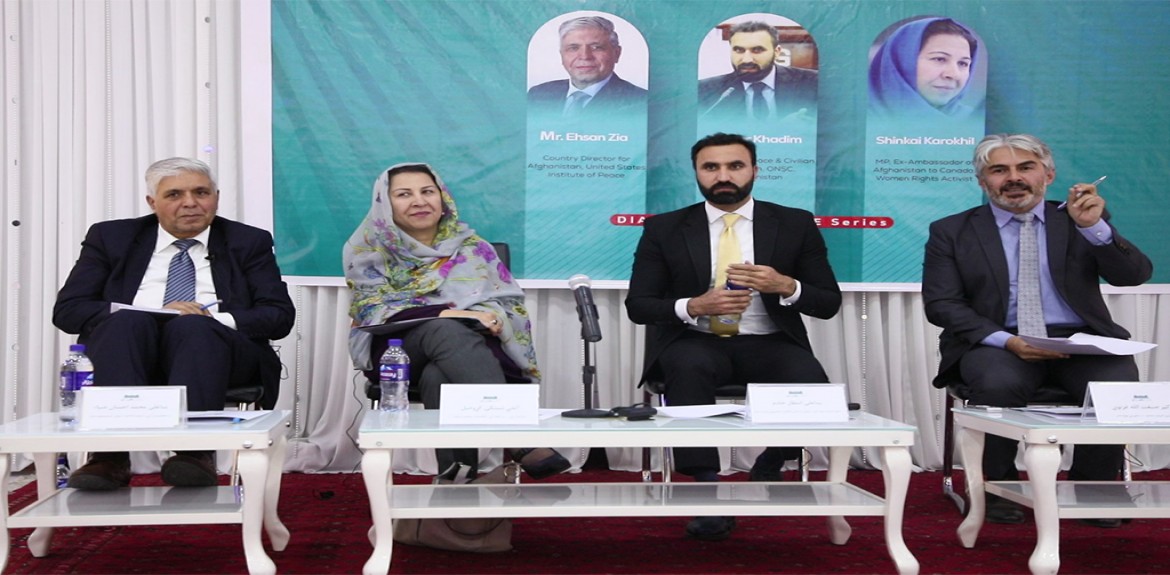
On October 14, 2020, Tarzi Research Foundation (TRF) organized and hosted a conference on recent developments in the Afghan peace process and the demands and concerns of the Afghan people.
Seminar Report
On October 14, 2020, Tarzi Research Foundation (TRF) organized and hosted a conference on recent developments in the Afghan peace process and the demands and concerns of the Afghan people. The panelists were Shinkai Karokhil, Member of Afghan Parliament and ex-Ambassador to Canada, Intizar Khadim, Director of Peace, Sanction and Civilian Protection at Office of the National Security Council (ONSC), and Mr. Ehsan Zia, Country Director for Afghanistan, United States Institute of Peace (USIP). Tens of Afghan scholars, researchers, officials, and students, both male and female, had participated in the event.
TRF Deputy Director, Dawood Mohammadi introduced TRF and its activities at his opening remarks since its establishment in 2018. For more information about TRF, please visit (www.trf.af).
Shinkai Karokhil talked about the essence of peace and war. In contrast, ONSC's Intizar Khadim, who had spent more than two weeks in Qatar and had observed the on-going peace talks between the representatives of the Islamic Republic of Afghanistan and the Taliban delegation, said that there are fears, hopes, challenges, and opportunities.
Intizar Khadim believes that "the Government of the Islamic Republic of Afghanistan has taken unprecedented steps to make sure the Afghan peace process is on track," he said. The Taliban, he added, must acknowledge that war is not won with war - blood is not washed with blood, and they need to be flexible by all means. We are not a collapsed government, and the Taliban should not think of such a thing, he stressed. While discussing the peace process academically, Intizar Khadim emphasized strategic patience, a broad framework of peace, and that peace is the game of words, not the ground of battle.
USIP's Ehsan Zia talked about the historical and futuristic aspects of the issue. Mr. Zia underscored the possibility of the Afghan peace talks' success as, he recalled, more than 60 countries, except for Sri Lanka, had put an end to their conflict through negotiations. Mr. Zia also accentuated the unmatched international community support to current Afghan talks. He believed that it is an infrequent opportunity after the Bosnian Peace Accord in Paris in 1995, which had widespread international support. Ehsan Zia advocated that a nation be developed, and sustainable institutions shall become established for the peace to be favorable and sustainable. While saying that war is not an option, he proposed that a positive mentality be created for peace, and political peace shall be empowered with social harmony.
At the Panel Discussion in the second part of the conference moderated by TRF Director, Dr. Sibghat Ullah Ghaznawi, about a dozen questions were received from the participants in two rounds. The questions were mainly focused on the role of media in the peace process; future of Afghanistan if not reached a negotiated political settlement; the status of simultaneous fight and talks; lack of confidence among parties; Islamic Republic of Afghanistan flexibility against Taliban deemed too much; poor economic conditions at times of talks; women direct meetings with Taliban; national values or national interests; transitional justice; access to information of on-going peace talks; implications of release of 5,000 Taliban prisoners; and Taliban maneuvers and provocations in vicinity of cities; particularly, the Capital Kabul.
While providing answers to her questions, Mrs. Shinkai Karokhil said that a totalitarian system and dictatorship do not have place in Afghanistan anymore. According to her, some issues are imposed and exigent for both parties. The Taliban should consider Afghan women in every decision as they make half of the 37 million Afghan society. MP Shinkai Karokhil also emphasizes the representation of youth in the peace talks through a transparent, specific mechanism, which, unfortunately, is yet to be comprehended.
In his turn, Intizar Khadim answered the questions referred to him and said that flexibility is a part of the process, and the outcome is the best. Strategic patience is needed as the final result will be the realization of peace in the country. Mr. Khadim underlined Afghan national and civil activists' role in the peace process for their voices to be heard and included in the talks. Regarding definition of the national values and national interests, Mr. Khadim referenced the Afghanistan Constitution, particularly Article 5 and Article 6. The last but not the least, Mr. Khadim said that peace is not easy; it is full of complexity, it is the shared cause of government and nation, and it is both the aspiration and ultimate goal.
USIP Country Director Afghanistan, Mr. Ehsan Zia, also replied to inquiries referred to him. He talked about the experiences of other nations in the times of talks. He stressed on Afghans' tactfulness and the active diplomacy of the government of the Islamic Republic of Afghanistan in this regard.
